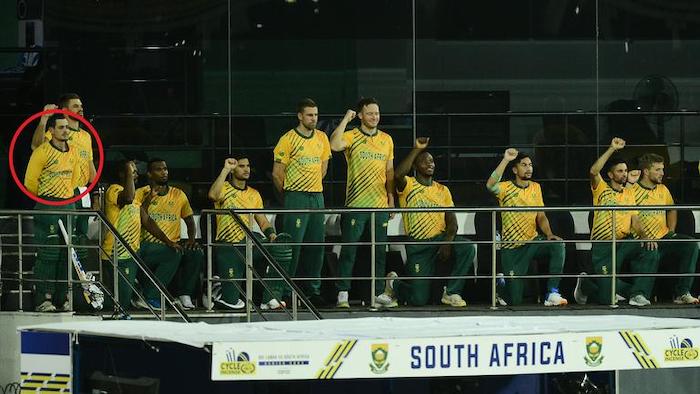Minutes before the toss in a Super 12 fixture between South Africa and West Indies in Dubai, the South African wicket-keeper Quinton de Kock made himself unavailable for selection. He made the decision after Cricket South Africa (CSA) released a statement saying that all players should take a knee before their remaining T20 World Cup matches in support of the ‘Black Lives Matter’ movement.
De Kock is one of the South African players who had not been taking a knee ahead of the games, including the team’s tournament opener against Australia, with some players kneeling, some raising a fist, and a few standing as well. The way players have acknowledged a stance against racism was the primary reason CSA issued a clear directive to its team members.

De Kock’s refusal to take a knee at the T20 World Cup has divided opinions in South Africa.
“Gone are the days when cricket was the standard-bearer of progress, unity and inclusivity in the country; that flag is arguably now being flown by Siya Kolisi’s Springboks,” wrote News24 columnist Pieter du Toit in reference to his country’s Rugby World Cup winners.
“Add to that the dire administration of the game, with allegations of mismanagement and corruption, and the normal peaks and troughs of a sports team, and cricket is at a low point.”
A hashtag #IStandwithQuinton appeared on social media, especially among right-wingers, defending their star player’s right to dissent.
However, a few agreed that this decision could end De Kock’s participation in the remainder of the World Cup and his international career for South Africa.
“This is probably the end of his participation in the World Cup and maybe even his international career as a cricketer,” wrote analyst Max du Preez in a column for Afrikaans news site.
Radio commentator Bongani Bingwa, meanwhile, noted De Kock’s willingness to embrace other symbols. But like many others, he questioned CSA’s wisdom in requiring such gestures.
“If Quinton De Kock wears pink for cancer or black arm bands to honour deceased greats or to oppose GBV (gender based violence) when required, why object to a universally accepted gesture to fight racism?” he said.
“But equally is it still a principled stand if it’s mandatory?”
De Kock also refused to take a knee during the West Indies tour earlier this year. Even there, he stood with both arms behind his back.
